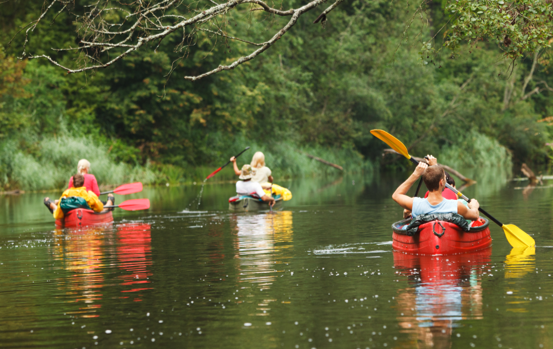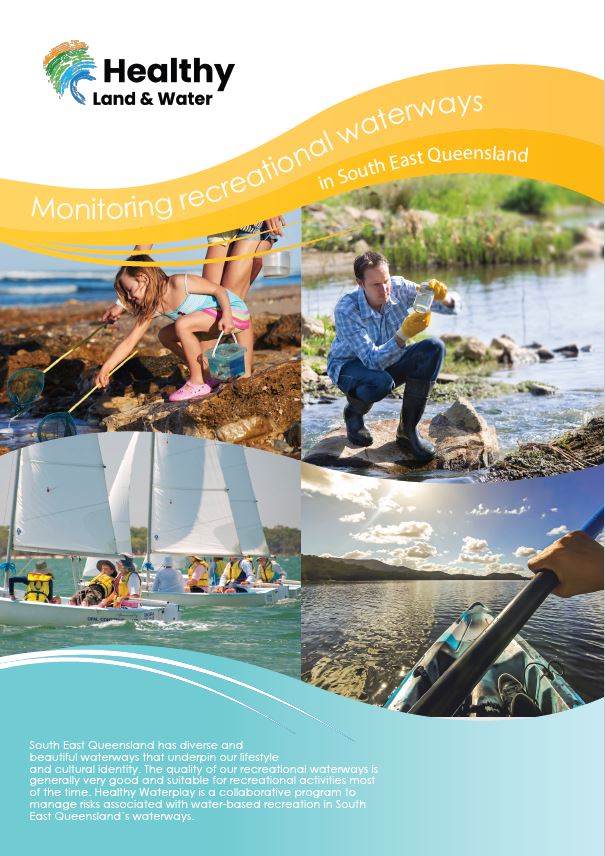
Healthy Waterplay
Protecting the community against potential health risks of waterway recreation.
| Providing information about the potential health risks associated with waterway recreation | |
|
Healthy Waterplay |
|
|
Healthy Waterplay Factsheet - Monitoring recreational waterways in South East Queensland (2023) |
|
|
TIPS: |
The Healthy Waterplay program provides our region’s communities with information about the potential health risks associated with waterway recreation and supports regionally consistent monitoring of recreational water quality in South East Queensland.
While the dangers of rips are quite well-known, less well-known are the risks associated with waterway pollution, which can lead to illnesses including gastrointestinal and eye infections.
The Healthy Waterplay program provides our region’s communities with information about the potential health risks associated with waterway recreation.
The program supports regionally consistent monitoring of recreational water quality in South East Queensland.
The program focuses on:
- Developing key health messages and suitability grades.
- Information and tools have been developed to assess the recreation suitability of waterways across South East Queensland.
- Enabling people to make informed decisions about where and when to use waterways for recreation.
- Providing our region’s communities with information about the potential health risks associated with waterway recreation.
What we are doing
Information and tools have been developed to assist managers such as local government and local councils in assessing the recreation suitability of waterways across South East Queensland.
These resources align with the national guidelines and are endorsed by Healthy Land & Water members and the Human Health Scientific Expert Panel.
Once monitoring is completed, key health messages and suitability grades are developed and reported.
Measuring success
As a result of the program, the information is shared with communities across South East Queensland to help people make informed decisions about where and when to use waterways for recreation, protecting them against potential health risks.
Why this project is important
|
However, there is a strong link between rainfall events and the health of our waterways. Rainfall can wash pollutants into our waterways causing certain areas to become unsuitable for recreation. Waterway pollution can lead to mild illnesses such as stomach upsets and infections. Use your best judgment and follow the advice of local authorities to keep safe while enjoying our waterways. |
Project snapshot
 Monitoring recreation suitability of waterways.
Monitoring recreation suitability of waterways.
Project collaborators
This project is supported by Healthy Land & Water, the Queensland Government, Redland City Council, Logan City Council, City of Moreton Bay, Sunshine Coast Council, Noosa Council, Somerset Regional Council, Scenic Rim Regional Council, Lockyer Valley Regional Council, Ipswich City Council, Seqwater, Urban Utilities.
Frequently asked questions
How can I help?
There are several things you can do to help keep our waterways safe and clean for all to enjoy:
- Use designated toilets and waste facilities.
- Ensure young children have frequent toilet breaks.
- Dispose of human waste correctly when boating and do not discharge sewage, litter, or other waste into recreational waterways.
- Avoid swimming if you have diarrhoea or vomiting.
- Clean up after your pets, ensuring feces do not enter the stormwater system or waterways.
- Report sewage spills to your local water utility and report other pollution incidents to your local council.
- Maintain onsite sewerage facilities such as septic systems, contact your local council for advice.
- Ensure household stormwater is not connected to the sewerage system.
- Take litter home with you and pick up any litter you see if safe to do so.
How do I report a pollution incident?
Please contact your local water utility to report a sewage spill or your local council to report other pollution incidents.
What should I do if I come into contact with potentially polluted water?
If you come into contact with a potentially polluted waterway, it is advisable to wash with soap and clean water as soon as possible. Pay particular attention to any open cuts to prevent infection.
What should I do if I get sick?
If you experience stomach upsets or infections after contact with a waterway, please visit your doctor for medical advice.
Who is most vulnerable?
Certain people may be more vulnerable to contracting illness and infection than others. Children under five years old, the elderly, people with compromised immune systems, and people with open cuts are generally most at risk.
More resources
Useful information for the community
- Monitoring recreational waterways in South East Queensland (the Ecosystem Health Monitoring Program (EHMP))
Resources for waterway managers
- Healthy Waterplay Trigger Values Justification Paper
- Healthy Waterplay Training Manual and Tool
- Enterosis A: A statistical Decision Support Tool for Categorization of Microbial Quality of Recreational Water
The Human Health Science Expert Panel is comprised of:
- Daniel Field – Queensland Government
- Dr Anne Roiko – Griffith University
- Dr David Cunliffe – South Australia Department of Health
- Dr James Smith – JJSMITH Consult
- Dr Cameron Veal – Seqwater
- Andrew Cook – Queensland Health
- Simon Toze – CSIRO


